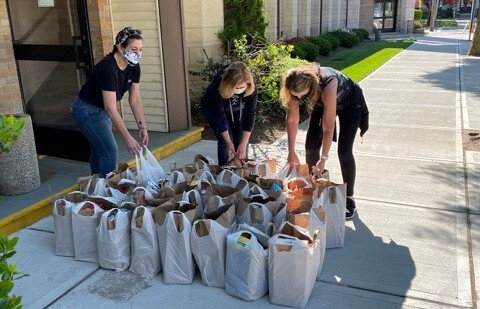New task force promises to support food pantries
The COVID-19 pandemic impacted numerous industries in New Jersey, but perhaps none felt its effects more than food pantries. With so many people losing their jobs and going hungry — Community FoodBank of New Jersey estimates 1.2 million state residents were food insecure during 2020, up from 774,860 people in 2018 — the Archdiocese of Newark’s food pantries were overwhelmed with clients in desperate need. Fortunately, Father Timothy Graff knew how to help them.
Father Graff, who is the director of the Archdiocese’s Social Concerns Office, recently launched the Food Insecurity/Food Pantry Task Force to unite archdiocesan pantries throughout Bergen, Essex, Hudson, and Union counties. The task force’s purpose is to be the central entity through which participating food pantries can easily share ideas and resources. And even if a pantry does not need help, it can still make a difference by supporting its fellow members.
“A lot of times parish food pantries will receive a large donation that’s really too much to take in, so they’ll share it with the food pantry two towns away because they know there’s a great need there,” Father Graff said. “It’s that type of cooperation that we’re looking to do. We want to get people working together for the common mission of helping the hungry.”
Things look promising for the task force so far. Father Graff said approximately 60 parishes have joined the group since it started earlier this year, and they have already begun using the network to share surplus food with pantries that need it. Beyond that, he said many pantries are exchanging best practices on how to enhance their ministry. This includes everything from offering methods for better connecting with parishioners to proposing ideas for increasing donation numbers.
Parishes do not need a food pantry to benefit from the task force. Father Graff said churches that have collected food for the hungry are welcome to connect with the group to locate a pantry that could use the donations. Likewise, he said parishes thinking about forming pantries of their own should consult with the task force to learn the logistics of organizing one. Father Graff is hosting a Zoom meeting on that topic on June 17 at 7 p.m., which can be accessed here.
Anyone interested in launching a pantry should attend the gathering because congregations are always eager to help the food insecure, Father Graff said.
“It’s a tangible way for people to live out the Gospel. It’s a fulfilling ministry. And it’s very popular because people like to see concrete results. Nothing is more concrete than feeding the hungry,” he added.
John Schmunk, who runs Sacred Heart Church’s Helping Hands Ministry in Rochelle Park with his wife Samantha, knows the impact of a food pantry. Schmunk recalled discussing Thanksgiving plans with one of his pantry’s clients when he was shocked to hear the woman say she would have no food at all if it were not for Helping Hands. It was at that moment when he realized the importance of this work, he said, pointing out that food pantries truly bring the spirit of Christ to people in need.
Helping Hands Ministry benefits many people, too. According to Schmunk, the pantry normally provides clients with an average of 75 to 80 large bags of pasta, cereal, rice, and a multitude of other food items each week. Moreover, he hopes it helps even more people by participating in the task force. While Helping Hands has not started sharing its food yet, Schmunk is grateful to Father Graff for providing a means through which to do so.

“I think that Father Tim is a true inspiration for creating this task force,” Schmunk said. “Food insecurity is a real problem in our Archdiocese, and I believe his vision to see this problem and put together an action plan to help address it is an example of Christ working through our priests to help his people.”
Sister Linda Klaiss, who leads the Pierre Toussaint Food Pantry of St. Mary’s Church in Newark, is also eager to begin working with the task force. Father Graff specifically asked her to share her expertise regarding how to operate a pantry best, and she has a lot of wisdom to offer.
For instance, Sister Linda said the most important thing a volunteer can do is treat clients with compassion because people will not come to pantries where they feel disrespected. She also encourages pantries to provide healthy items to those in need rather than offering canned goods and junk food. To obtain such items, she suggested partnering with an organization like the MEND Hunger Relief Network or asking parishioners to donate nutritious food during charity drives.
Above all, Sister Linda urges food pantries to observe what successful organizations are doing and collaborate with them whenever possible. That is why the task force is such a great idea, she said — it makes it easy for pantries to work together.
“The need in New Jersey is huge,” Sister Linda said, pointing out that the Pierre Toussaint Food Pantry has been giving out more than 200 bags of food each week since the pandemic started when they previously only gave out roughly 200 bags per month. “We can all do a better job of helping if more people pool their resources and ideas and energy and come together to brainstorm ways of making sure there are fewer people hungry going forward.
“There are so many ways that, working together, we can make a difference for the people who are in need,” she added.
To learn more about launching a food pantry or joining the Food Insecurity/Food Pantry Task Force of the Archdiocese of Newark, contact Father Timothy Graff at 973-497-4318 or rev.timothy.graff@rcan.org.


